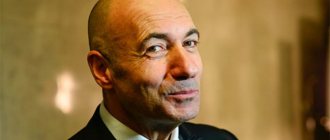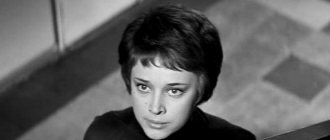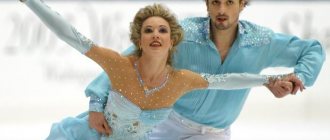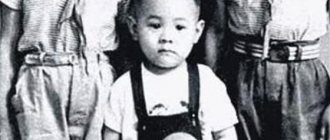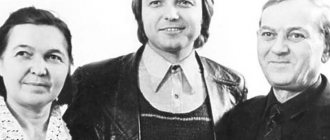The success of Hamlet abroad
Michael Ebert: “Hamlet,” which you are touring all over the world after its premiere in Avignon, is universally admired, and it seems that the play managed to touch the nerve of the era. What happens to an actor who becomes the object of such an extreme cult?
Lars Eidinger: First of all, I am glad that our work is being recognized outside of Berlin. We are praised wherever we go. One journalist in Sydney said to me: "I heard that you are the greatest actor in the world."
What did you answer?
He said that it was (laughs). We were greeted accordingly. It really was something special.
Do people tell you what it is that fascinates them so much?
In Moscow they said that my Hamlet is the embodiment of an absolutely modern type of person and this has never been seen on stage before. I've been asked if I'm aware of the impact this has on viewers.
Or maybe this absolutely modern type of person is simply a narcissistic performer, a product of pop culture?
Rather, it is due to the fact that on stage I am ready to reveal the most secret things to the viewer. When people see that someone is willing to bring more than their strengths to the table, it makes an impression. The audience gets the feeling that they are looking into my very heart. I was lucky in the sense that my phenotype is rather non-standard. I don't look like a person to whom others do not forgive good luck, envying his attractive appearance. I don't fit the ideal of beauty, at least not my face. Rather, I am something strange. My body is trained and has quite clear contours, but at the same time I have a rather feminine ass. Which is rather the Greek ideal of beauty. Although in Moscow they said that when I remove the cotton frame in Hamlet, it is a real miracle.
Which further enhances your vanity.
Well, I’m really terribly cool (laughs).
How does it feel for you to return to the German theater stage after resounding success abroad?
I really love playing in Germany. You can see from the reactions of the public how smart they are. But still, the delight and admiration with which we are received abroad is sometimes not enough. The Russians were impressed by our Hamlet, because such a theater was unthinkable for them. The way we handle text, the way we use video, the way we work with the body, the fact that my crown is on backwards—they find it sensational. Their theater is different.
Is he more conservative?
More static. The French do too. After the screening of “Demons” in Paris, French student actors told me that they did not have such an incredibly physical theater (körperliches Theater). Nothing happens on stage from the neck down.
In your opinion, is the German theater ahead of other modern theaters?
Modern theater is probably the most developed in Germany. But these questions don’t particularly interest me.
Lars Eidinger's wife - Ulrike Eidinger
The wife of the popular actor is a significant person for opera lovers. The woman very often goes on tour around the world. Her voice is admired by a large number of classical music lovers around the world.
Lars Eidinger's wife, Ulrike Eidinger, was born in West Germany. She simultaneously combined classes in regular and music schools. After completing the coveted certificate, she began to study at the Berlin Music Academy. The girl constantly grew professionally, attending master classes by the most famous German musicians.
After graduating from university, the girl became one of the opera singers. Lovers of classical music enthusiastically greeted her soprano in “The Passion of Marcus”, “Church of Fear” and others.
The young people met at one of the charity events. Soon love blossomed between them, leading to marriage. The celebration took place in one of the best Berlin restaurants. The couple spent their honeymoon in Paris.
In 2007, the couple had a daughter. Details about the girl cannot be found out.
Despite the rumors that arise every now and then about their separation, the couple are still together. They always appear at events together, happily posing for numerous paparazzi. This February, married couple Lars and Ulrike will celebrate 11 years of marriage. The couple want to take their daughter and travel together to the Mediterranean coast.
The danger of routine
One young stage director recently complained that our theater production is dominated by routine and calculated effects.
I don’t see the danger of routine in my work at all.
How do you avoid her?
No way. I go to the theater, recite the text a little and try to “reset to zero” (versuche mich zu NULLen) for ten seconds just before leaving, and then go on stage.
So you don’t start the day by saying to yourself: today I’m playing Hamlet, I need to concentrate on this figure?
No.
You take your child to kindergarten, pick him up, go shopping, read newspapers in a cafe, live your life.
Yes, I leave the house about an hour before the performance. I don't go to the dressing room. I'm one of the few actors who never goes into the dressing room.
Do you do your own makeup?
I don't wear makeup at all.
Aren't you looking for reincarnation?
I'm looking for an absolute transformation! But through acting, not through makeup.
However, in one interview you said that you always use makeup.
Yes, I have experienced certain changes here. Previously, I saw my acting in the tradition of puppet theater and imagined that I was a puppeteer. What fascinated me was that the puppeteers in black were behind their puppets and controlling them. After all, in a puppet theater you can see how everything happens; it does not achieve complete illusion. The ability to hide behind the hero during the game and sometimes peek out from behind him was extremely fascinating to me. But during filming, I realized how exciting it can be to connect with a character as one.
Eidinger, Lars - what is it?
Born in West Berlin in the family of an engineer and a children's nurse. I went to school in the Marienfeld area. From early childhood he was interested in acting. At about the age of ten, he first appeared on television for one of the youth series. As a schoolboy, he participated in sports and theater clubs and performed in amateur performances.
From 1995 to 1999 he studied at the Ernst Busch Academy of Dramatic Arts. He began his career as a theater actor. While still studying, he acted in several productions at the Deutsche Theater. In 2000, he first received the main role in a play at the Schaubühne theater, where he subsequently firmly established himself, becoming one of the most involved actors on this stage by the end of the 2000s. During this period, he played in many productions by Thomas Ostermeier, whose directorial style mainly contributed to Eidinger’s creative development during his student years. He played and plays, among other things, in a number of productions based on Shakespeare's plays (Macbeth (2002), A Midsummer Night's Dream (2006), Hamlet (2008, 2010, 2011, 2012), Measure for Measure ( 2012), “Richard III” (2015)), which became a kind of acting “calling card” of Eidinger. Since 2008, Eidinger has worked in Schaubühn as a director, staging two plays there.
He made his debut on television in 2002 with a cameo role in the series “Little Einsteins.” The first major work in cinema was the role in the film “Passion Knows No Barriers” (2009)[5][6]. He is best known for his roles in the films “2016: End of the Night” (2011), “Goltzius and Pelicanya (2014), “Personal Shopper” (2016)[7][8].
In the scandalous[9] film “Matilda” he played the role of Tsarevich Nikolai Alexandrovich[10]. After the Matilda trailer appeared in early 2020, the film became the cause of a public conflict that has flared up since November 2020[9]. During the ensuing discussion, Eidinger became the subject of attacks by Orthodox activists who wanted to prevent the film from being shown in Russia, while he was repeatedly mentioned as a porn actor[11][12]. In interviews with Russian media, Eidinger has repeatedly denied that he is such. Thus, in an interview with Meduza in June 2020[13], Eidinger suggested that the reason for these rumors could be his role in Peter Greenaway’s film “Goltzius and the Pelican Company,” where in one of the scenes he appears naked with an erection (but without sexual intercourse) . According to him, in some of the performances of the Schaubühne theater, Eidinger also appeared on stage naked, but things did not go further than that, and the scene in the film “Goltzius and the Pelican Company” is by far the most “free” scene he has ever played . Eidinger expressed the opinion that, nevertheless, it would hardly occur to anyone to call Greenaway’s paintings pornography.
In 2020, the actor was invited to Moscow, where he presented the film “Yesterday’s Bloom” at the opening of the 3rd Moscow Jewish Film Festival.[14][15]
Lars Eidinger refused to come to Russia for the premiere screening of Matilda. He justified his decision on security grounds[16]:
I am afraid that someone will harm me or attack me.
At the beginning of 2020, he participated in the recording and filming of the video “Diamant” by the Love Hotel Band, whose vocalist is the Austrian rapper Jung Hurn. The video and composition are set in a 1980s setting and have collected more than a million views on YouTube[17].
Merge with role
Does an actor sometimes forget that he is acting?
This is the direction I am moving. I felt this for the first time in the role of Hamlet. I noticed that I experience more the more I give into the game. Two or three years ago I would not have dared to do this.
But do you get more feedback from the public?
When I let people know that I'm playing without a protective mask, the game takes on a different level of intensity. The fact that I make myself vulnerable has a special effect on the viewer.
Why vulnerable? You can put a doll in front of you at any time.
But I want to seduce the audience.
What if they don't give in?
There are tricks to convince them. You can change the rhythm, take inorganic pauses.
How about sex?
That's it.
Childhood and youth
Eidinger was born on January 21, 1976 in Berlin in the family of a nurse and an engineer. He studied at the Gustav Heinemann educational institution. The boy's acting abilities appeared very early. In 1980, Eidinger began his career. It is noteworthy that at that time he was only four years old. Then he took part in the filming of the film “SFB”. At the age of ten he participated in the television project “Bibi-Block”.
While still studying at a general education institution, Aidinger went in for sports and attended drama clubs. He performed roles in such performances as “The Career of Arthur Ui”, “Woyzeck”, etc. Having received a diploma of secondary education in 1995, the future film star became a student at the Ernst Busch Academy of Dramatic Art. While receiving higher education, he actively participated in the performances of Jürgen Gosch.
Protagonist Advantage
Do you manage to throw off the mask that everyday life imposes on you in those few seconds of zeroing?
Zeroing is an important point.
How do you achieve it?
I don't think about anything. I close my eyes and place my thumb and index finger on them. This is how I mentally move myself into the situation. In this sense, of course, it is easier for the protagonist, he can start from scratch. There are roles in which you go on stage and must immediately seethe to the fullest. In the role of Hamlet, I can go on stage from scratch.
And see how things go?
I sometimes compare it to Second Life. This is a computer game in which you can become a certain hero and live his life. The funny thing is that everything you do causes reactions in other characters and you, in turn, must react to their reactions. It's the same on stage. The difference is that the partners' reactions are programmed.
But in a computer game too.
But you don't know when what reaction will follow. On stage, I know this and try to avoid it. I don’t stubbornly repeat what we came up with during rehearsals, but try to provoke my partner to decide on something new. The opportunity to break established agreements during the game gives me a special degree of freedom. I am not one of those who wants to come up with something new at any cost. Coming out today on the left and tomorrow on the right is pure originality. Everything I do on stage must be born out of character. The actor must, at any moment while on stage, try to play what has been agreed upon in advance as if it had just occurred to him. Even if it's just about getting out of your chair. Playing at this level of concentration is, of course, more difficult than leaving yourself to a routine. In the role of Hamlet, I reach such a state of exhaustion that I cannot always control my performance one hundred percent. But this is also part of the plan. I'm losing myself in the game. The same thing happens with Hamlet. It's like when you're running a long distance, when you suddenly feel like your legs are running and running on their own.
Biography[ | ]
Born in West Berlin in the family of an engineer and a children's nurse. I went to school in the Marienfeld area. From early childhood he was interested in acting. At about the age of ten, he first appeared on television for one of the youth series. As a schoolboy, he participated in sports and theater clubs and performed in amateur performances.
From 1995 to 1999 he studied at the Ernst Busch Academy of Dramatic Arts. He began his career as a theater actor. While still studying, he acted in several productions at the Deutsche Theater. In 2000, he first received the main role in a play at the theater "", where he subsequently firmly established himself, becoming one of the most involved actors on this stage by the end of the 2000s. During this period, he played in many productions by Thomas Ostermeier, whose directorial style mainly contributed to Eidinger’s creative development during his student years. He played and plays, among other things, in a number of productions based on Shakespeare's plays (Macbeth (2002), A Midsummer Night's Dream (2006), Hamlet (2008, 2010, 2011, 2012), Measure for Measure ( 2012), “Richard III” (2015)), which became a kind of acting “calling card” of Eidinger. Since 2008, Eidinger has worked in Schaubühn as a director, staging two plays there.
He made his debut on television in 2002 with a cameo role in the series “Little Einsteins.” The first major work in cinema was the role in the film “Passion Knows No Barriers” (2009)[3][4]. He is best known for his roles in the films “Goltzius and Pelicanya” (2014), “Personal Shopper” (2016)[5][6].
In the scandalous[7] film “Matilda” he played the role of Tsarevich Nikolai Alexandrovich[8]. After the appearance of the Matilda trailer at the beginning of 2020, the film became the cause of a public conflict that has flared up since November 2020[7]. During the ensuing discussion, Eidinger became the subject of attacks by Orthodox activists who wanted to prevent the film from being shown in Russia, while he was repeatedly mentioned as a porn actor[9][10]. In interviews with Russian media, Eidinger has repeatedly denied that he is such. Thus, in an interview with Meduza in June 2020[11], Eidinger suggested that the reason for these rumors could be his role in Peter Greenaway’s film “Goltzius and the Pelican Company,” where in one of the scenes he appears naked with an erection (but without sexual intercourse) . According to him, in some of the performances of the Schaubühne theater, Eidinger also appeared on stage naked, but things did not go further than that, and the scene in the film “Goltzius and the Pelican Company” is by far the most “free” scene he has ever played . Eidinger expressed the opinion that, nevertheless, it would hardly occur to anyone to call Greenaway’s paintings pornography.
In 2020, the actor was invited to Moscow, where he presented the film “Yesterday’s Bloom” at the opening of the 3rd Moscow Jewish Film Festival.[12][13]
Lars Eidinger refused to come to Russia for the premiere screening of Matilda. He justified his decision on security grounds[14]:
I am afraid that someone will harm me or attack me.
At the beginning of 2020, he participated in the recording and filming of the video “Diamant” by the Love Hotel Band, whose vocalist is the Austrian rapper Jung Hurn. The video and composition are set in a 1980s setting and have collected more than a million views on YouTube[15].
Bonuses
Where do you get the strength for this?
There is a computer game called Jump-and-Run, where little people run from left to right through a computer screen. They can receive bonuses that give them new energy. I sometimes think about this on stage. The public's reactions are my Credits. When I'm so stressed out that I think I'm going to drop dead, I jump up and take another "life."
What makes you go to the cutting edge in a game, to the brink of vulnerability?
My biggest fear is that the viewer will watch my play while maintaining a distance. When I am completely open, I can encourage the viewer to follow me. To be horrified by discovering my own traits in my character. The viewer should not watch the game from the sidelines, he should be part of it.
How do you know if you succeed?
I feel a compaction of energy in space.
Career
In 1999, the actor began working on the stage of the Schaubühne Theater. There he became one of the busiest artists. He performed on stage in such performances as “Gedde Gabler”, “Demons”, “Measure for Measure”, etc. The actor toured several dozen theater festivals with the production of Hamlet.
Since 2001, Lars Eidinger began acting in films. He started with the famous television show “Police Phone,” where he ended up taking part for about 11 years. He was also a participant in the Crime Scene project. He took part in the filming of other serial projects, which later gained popularity in Germany and Europe.
In 2012, he starred in the main role in the pornographic project “Goltzius and the Pelican Company.” Later, the artist’s philography was replenished with such films as “End of the Night”, “Summer Window”, “Code Blue”, etc.
In 2008, the artist began directing. So, he staged the play “Thieves”. The man’s first work was liked not only by the audience, but also by theater critics.
Eidinger starred in the film "Matilda", which is dedicated to the love story of the Russian Tsar and the ballerina.
“I like it when a person is comprehensively developed. So I decided to develop in many directions. Moreover, I like all these activities. They bring me not only income, but also pleasure,” admits the artist.
In parallel with filming processes in films and performances on the theater stage, the artist writes music. For example, in 1998, one of the Berlin recording studios released a collection of his compositions “I’ll Break My Leg.” In 1999, he created the music for the film “Mr. Miller’s Killer.”
The path to the profession
You once told a journalist that during Hamlet you fell off the table and, despite the extreme pain, continued to play. Is there some special drive in this - to play, overcoming pain and exhaustion?
I hurt myself every now and then while playing. But while the audience is looking at me or the camera is pointed at me, I don’t notice it. I only get angry if this happens during rehearsals. I'm interested in testing the boundaries of what is possible. The first profession I chose as a child was a zookeeper. I was amazed by the feeding of the seals at the zoo, I wanted to be that person who stands on the rock and throws fish to the seals. I imagined several hundred people standing below, clapping as the seal caught the fish I threw.
Did you want to be someone who is looked at when he does something?
I wanted to stand on a rock and feel like people were applauding me when I threw a fish. I was then about the same age as my daughter is now—three years old. I became more and more fascinated by the idea of becoming famous. If you grow up with Bravo magazine and identify with the world of pop culture, then sooner or later there will come a time when you have to decide whether you are one of those who praise someone and hang posters of him on the wall, or to those who want to be extolled. I always wanted to be the one on the poster. This was my biggest dream.
You wanted to be a Performer.
That's it. When I saw someone enjoying the game...
And at the same time the audience is watching them.
…then I immediately wanted to do exactly that. I played football seriously for a long time. Then he played tennis professionally. Also frantic, with training seven times a week on the courts, with general physical fitness. With trips to Florida for training camp. I had real ambitions in tennis. However, I never went to watch Bundesliga competitions. The urge to play myself was so strong that I could hardly bear to be a spectator. Some time later, I realized that it was the profession of an actor that best suited this desire of mine <...> Then there was training at the Ernst Busch School of Acting, my first roles, collaboration with director Jürgen Gosch, the first contract offered by the Deutsches Theater in 1998 .
Eidinger, Lars
Born in West Berlin in the family of an engineer and a children's nurse. I went to school in the Marienfeld area. From early childhood he was interested in acting. At about the age of ten, he first appeared on television for one of the youth series. As a schoolboy, he participated in sports and theater clubs and performed in amateur performances.
From 1995 to 1999 he studied at the Ernst Busch Academy of Dramatic Arts. He began his career as a theater actor. While still studying, he acted in several productions at the Deutsche Theater. In 2000, he first received the main role in a play at the Schaubühne theater, where he subsequently firmly established himself, becoming one of the most involved actors on this stage by the end of the 2000s. During this period, he played in many productions by Thomas Ostermeier, whose directorial style mainly contributed to Eidinger’s creative development during his student years. He played and plays, among other things, in a number of productions based on Shakespeare's plays (Macbeth (2002), A Midsummer Night's Dream (2006), Hamlet (2008, 2010, 2011, 2012), Measure for Measure ( 2012), “Richard III” (2015)), which became a kind of acting “calling card” of Eidinger. Since 2008, Eidinger has worked in Schaubühn as a director, staging two plays there.
He made his debut on television in 2002 with a cameo role in the series “Little Einsteins.” The first major work in cinema was the role in the film “Passion Knows No Barriers” (2009)[5][6]. He is best known for his roles in the films “Goltzius and Pelicanya” (2014), “Personal Shopper” (2016)[7][8].
In the scandalous[9] film “Matilda” he played the role of Tsarevich Nikolai Alexandrovich[10]. After the Matilda trailer appeared in early 2020, the film became the cause of a public conflict that has flared up since November 2020[9]. During the ensuing discussion, Eidinger became the subject of attacks by Orthodox activists who wanted to prevent the film from being shown in Russia, while he was repeatedly mentioned as a porn actor[11][12]. In interviews with Russian media, Eidinger has repeatedly denied that he is such. Thus, in an interview with the Meduza portal in June 2020[13], Eidinger suggested that the reason for these rumors could be his role in Peter Greenaway’s film “Goltzius and the Pelican Company,” where in one of the scenes he appears naked with an erection (but without sexual intercourse ). According to him, in some of the performances of the Schaubühne theater, Eidinger also appeared on stage naked, but things did not go further than that, and the scene in the film “Goltzius and the Pelican Company” is by far the most “free” scene he has ever played . Eidinger expressed the opinion that, nevertheless, it would hardly occur to anyone to call Greenaway’s paintings pornography.
Lars Eidinger refused to come to Russia for the premiere screening of Matilda. He justified his decision on security grounds[14]:
I am afraid that someone will harm me or attack me.
At the beginning of 2020, he participated in the recording and filming of the video “Diamant” by the Love Hotel Band, whose vocalist is the Austrian rapper Jung Hurn. The video and composition are set in a 1980s setting and have collected more than a million views on YouTube[15].
Studio "Barak"
Despite such luck, did you not want to stay at the Deutsches Theater?
I constantly hung around at the Barak (the studio of the Deutsche Theater, where new drama was staged; since 1996, Thomas Ostermeier was the artistic director of the Barak, since 1999 he moved to the Schaubühne as a director and member of the artistic management of the theater) and hoped that that Thomas would approach me with an offer to move to the Schaubühne. But he still didn’t contact me. One day, seeing him on the square in front of the Deutsche Theater, I caught up with him and said that he should listen to me. He promised, but things never came to fruition. Then I took part in an acting reading at the Deutsches Theater, where a decision was made to grant me a contract.
Why were you so keen to get into the Schaubühne? Did you like what Ostermeier did in Barack so much?
Yes.
What performances did you see there?
All.
Theater
Lars Eidinger has been part of the Schaubühne theater troupe since 1999 and is one of the most involved actors. His track record includes roles in the following productions: “The Stranger from the Seine” (Albert), “Mr. Colpert” (Bastian Mole), “The Golden Age” (Bill), “Macbeth” (Malcolm), “Nora” (Doctor Rung) , “Demons” (Frank), “The Misanthrope” (Alceste), “Tartuffe” (Tartuffe).
Since 2008 he has been working at the Schaubühn and as a director. He staged the plays “The Robbers” and “Romeo and Juliet.”
Lars Eidinger (center) in the theater
Lars Eidinger is famous primarily for his sensational, according to critics, stage performances of the roles of Hamlet and Richard III in Shakespeare's plays.
Thomas Ostermeier
Was this a new theater for you that you wanted to take part in?
When I see Thomas’s performances, I still think today: it would be great to act in this play! What happened on the stage of “Barak” was my world. I kept putting off signing a contract with the Deutsches Theater, although there was already a verbal agreement. I took part in an acting reading at the Ernst Busch School of Acting Arts, which is organized for theater quartermasters. Afterwards, Tobias Veit and Jens Hillier (artistic directors of the Schaubühne) came up to me and said that I should definitely come to the Schaubühne. At the same time, there were two people from the German Theater standing in the foyer, who were supposed to make sure that I was not lured away to other troupes. But when I came home and listened to the answering machine, it was full of offers from different theaters.
Was one of them from Schaubühne?
Yes, I was invited to come to the reading. I met with Ostermeier. But the reading was completely unsuccessful. During the reading for the quartermasters, I benefited from the fact that the other readers spoke with all their might. If you listen to the rumble of well-choreographed voices of Ernst Busch graduates for three hours straight, you consider it a blessing when someone appears on stage who just sits on a chair and sucks a lollipop.
You really didn't say a word?
At first I really wanted to go without words. I thought: let’s see if it’s necessary to express thoughts out loud in a monologue. I wanted to break this theatrical postulate. But I didn’t have enough radicalism then. A minute later I finished the lollipop and said my monologue, which began with the words: “This is all going on for a very long time.” Of course, there was immediate laughter.
Didn't Thomas Ostermeier see anything funny in this?
If you perform alone in front of a director and do nothing else for a whole minute but just suck a lollipop, he starts to get bored to death. After all, there were no other actors at that time. In addition, the damn fan suddenly started working and Thomas had to go turn it off. I started over, started sucking on that stupid lollipop again, and the scene didn't work out at all. He said that he didn’t know why his colleagues were so delighted, he was bored listening to me, but he was ready to give me a second chance. The second time it didn't work out any better. But he worked with me a little on my monologue and still took me only because his colleagues were so delighted with me. In an interview with the newspaper Die Zeit, Thomas told how at one of the rehearsals I called him dad. I don’t remember this, but for me this is not surprising. A person is looking for people who can appreciate what he is trying to accomplish. Thomas is the person who understands me most correctly. It gives me space for maximum creative freedom. I can’t draw everything from myself. Two creative fantasies complement each other, and a third arises, which no one even thought about at first. This is Thomas' special quality. It makes it possible for something to arise that will not appear as a result of instructions. I'm especially aware of this when I work with other directors. Thomas gives me the feeling that he trusts me absolutely. Even if I make mistakes sometimes. He watches very carefully what I do and always knows when he should give me a sign to move on. Everything I do, I do just to please him.
Thomas Ostermeier about Lars Eidinger: “It seems to me that Lars had no choice but to become an actor. His brilliant wit allows him to animate characters in such a variety of ways that it is not clear whether he is serious or playing. Among his friends, he makes everyone laugh every now and then, but on stage he wants to be taken seriously, so that in a world thoroughly saturated with irony, we can look into the abyss of the human soul. Since I started working with him, Lars Eidinger has always strived to push the boundaries of the game to the point where everyone finally understands how serious he is. <…> Lars’ work on the Schaubühne stage is distinguished by a complete lack of fear of seeming ridiculous or unreliable <…>. He is primarily concerned not with the desire to please and receive good reviews from critics, but with the search for answers that his generation can give to the questions raised in classical and modern drama. During rehearsals, he constantly forces me to formulate what exactly affects me in the play. He provokes me to go further, discovering new and more complex facets of the work. Eidinger has no fear. Or at least it seems so. This is a rather rare quality in German theater, where many are afraid of doing something wrong. In my opinion, he managed to preserve the carelessness with which children play. She enchants him. <…> Eidinger is a child at play in a world where everything has slipped into a game of irony, into compromise thinking according to the “on the one hand - on the other hand” scheme. And Lars Eidinger did not lose hope that the game would be serious.”
Lars Eidinger, called a porn actor because of Matilda, can win in Tokyo
It’s scary to imagine what our activists would say if they saw “Yesterday’s Heyday.” This is, according to director Chris Kraus, a grotesque film about the Holocaust, making fun of all the foam that rises around this tragic topic. The script was written by Kraus himself. At first, Eidinger makes a strange impression: he doesn’t look like himself - a sad, poorly dressed character, killed by life. His hero, a renowned Holocaust researcher and grandson of a Nazi criminal, is in a state of crisis. Before our eyes, he will emerge from this state, thanks to a strange girl, played by the French actress Adele Haenel. This young lady is a French Jew. She grieves for her grandmother, who died in the gas chamber at Auschwitz. The girl is nervous - she attempted suicide five times, refuses to drink German beer, since this country killed her grandmother. And after he sleeps with a German, he will generally fall into hysterics. Eidinger's hero becomes her chosen one. It was his grandfather who killed that same grandmother. We see an old photograph of distant Riga times, where these same grandparents are sitting at the same desk. Aidinger's hero and his beloved will go to Riga. In a red coat, she will look defiantly impressive against the background of red flowers that are strewn with the graves of Holocaust victims. Much is built on incompatibility here. The film's director presented the film, and he was interested in how his work would be received in Japan. At a meeting with the public, he said: “What happens in our film is so far from you - European history, Latvia, Russia, Germany... How did you feel? For me, a love comedy becomes a drama, and then a grotesque.” Still, there is something personal in this whole story, although the director said that it was fiction.
On the opening day of the Tokyo Film Festival, a woman in a stroller appeared on the star path. There was nothing special about it. In Japan, older people and people with disabilities are given honor and respect. It turned out that this is the heroine of the non-fiction film “Two Journalists: One Century” by Atsunori Kawamura. He talks about our oldest colleagues who lived to see their 100th anniversary. Takeji Muno was born in 1915 and left this world on August 21, 2020. All his life he worked as a journalist, wherever he visited, even on German territory during the Second World War. Tsuneko Sasomoto was born in 1914 and celebrated her 102nd birthday on September 1st. She got married 4 months before the start of World War II. Tsuneko is the first Japanese female photographer to capture an entire century in her work. She's still working. Her photographs are known all over the world.
photo: Svetlana Khokhryakova
102-year-old female photographer Tsuneko Sasamoto
An old man is asked: “What is the secret of longevity?” And here is his answer: “It’s good to sleep, it’s good to eat.” Takeji's wife also lived a long life, passing away at 92 years old. We will see her alive again in the film. Mr. Muno is invited to a meeting with schoolchildren, who read prepared questions from a computer screen. They are bored listening to the memories of such an ancient person, although they even try to compare the past with the events in Syria. The filming, taken a little earlier, captured a still quite cheerful Muno, and in the finale we will see a terrible picture, so the question will once again arise: where is the line that the documentarian should not cross. The audience actually watches the onset of agony. In front of them is an old man writhing in a hospital bed. The arms are twisted, the legs are like matchsticks, the face is twisted, the mouth is open. Torment and suffering on a face covered with tubes. It's as if the filmmakers are waiting to die on live television. But they won't wait. The hero of the film will be sent home from the hospital, where he will die immediately.
One of the most exotic festival events takes place at the national shrine - the Kabuki theater. The ceremony there is planned down to the smallest detail and if it is scheduled for 16.02, then it will begin exactly at that time. Since it is impossible to film everything that happens on stage - this is a sacrament, the Kabuki actors went out to meet with journalists on the street. Onoe Kikunosuke often appears in films and TV series, and that evening he performed a virtuoso 37-minute performance “Sagi-musume” (“Heron Girl”), based on classical Japanese dance with the participation of musicians. He instantly changed his clothes right on stage, covering himself with an umbrella, amazingly with his dexterity. Snow was falling. Sagi-musume appeared in a snow-white kimono with a hood (female roles in Kabuki are played by men). Then she takes off her hood and appears in an unimaginably beautiful red dress. One kimono replaced another, according to the heroine’s mood. That same evening, Ichiro Furutachi, a master of the spoken genre, performed the performance “Blood`s Up at Takata-no-Baba”. Ichiro Kataoka constantly dubs silent films and organizes musical performances. He even came to Odessa for the silent film festival, where, accompanied by guitarist Yuri Kuznetsov, he presented archival films. In Kabuki, he played all the characters in the 52-minute Japanese film Chushingara, made in 1928.
photo: Svetlana Khokhryakova
Kabuki theater actors
Stage partners
I often get frustrated when my partners don't play hard enough. They don't really listen because everything I'm about to say they've already heard many times or they mechanically repeat memorized moves. Some colleagues, it seems to me, are not ready to take emotional risks. If they play a lament, they just change their voice a little to make it sound plaintive. They take care of themselves. So sometimes I feel like I'm wasting my time and I turn to the public in the hope of getting more from them.
You strive to move away from repeating agreed-upon scenes to something new, something that has not yet been tried.
I try to reach the limits. I don't just mean physical (bodily) boundaries.
Hamlet
I wanted to play Hamlet from the very beginning. I am all the happier that I was able to accomplish this. The actor must build a house, conceive a child, plant a tree and play Hamlet. Moreover, this role came to me at the right moment. The way I play it now, I couldn't have done it five years ago.
What does Hamlet mean to you? What do you think he can tell about our time?
Not a single actor in the world can convince me that Hamlet is a different person for him. Hamlet is always himself. There is something fundamental here. I put myself into this character, what excites and occupies me. At the same time, it allows for a huge degree of simulation, pretense, because we are talking about a game within a game. The peculiarity of Hamlet is that it can accommodate everything. The actor does not have the feeling that anything he would like to express in this role does not fit into it. The question “to be or not to be” is not raised with such fundamentality in any other play. When we go on tour, for example to Sarajevo, the first thing I am often asked is what can I say about the problem of corruption in the system. But it is not at all necessary to try to find a parallel with the modern political system. In my opinion, we are talking about more fundamental things. When I say “to be or not to be,” then “to be” is the mother who puts trust in me in the world. Seeing my mother lie, I lose that trust and experience incredible fear. I begin to perceive the whole world as lying. This is exactly what happens to Hamlet. Regardless of the relationship with my mother, this is the person from whom I descend. It connects me with life and death. When I notice that she is insincere, my worldview collapses. This is what Hamlet means when he says “the course of life is disordered.”
Actor Lars Eidinger: “I understood Nicholas II”
A Metro correspondent talked to the actor who played the Russian emperor in the film “Matilda” by Alexei Uchitel and found out how he worked on the image of Nicholas and why he considers the scandal surrounding the film to be unfounded.
In Germany you are one of the most famous actors of our time. But how did you manage to get the main role in a film by a Russian director?
We met Alexey Uchitel at a casting in Berlin. He invited me to come to Russia and audition for the role of Nicholas II. Alexey clarified whether I could read the lines in Russian? I was a little confused, because before this meeting I did not know a single word of Russian. Alexey gave me a collection of CDs with his films. I watched “The Edge”, “Space as a Premonition” and was amazed at how talented a director he is. I got excited about the idea of participating in his new project.
Was it difficult to get used to the image of the last Russian emperor? I think the make-up artists did a good job on your appearance...
Yes, of course. Costume and makeup play a big role. I spent two hours in the dressing room every day of filming. And the Russian language really helped me get used to the character. I kept speaking in Russian, but your actor will still voice me.
In your opinion, did you manage to achieve an external resemblance to the emperor?
It's hard to say because there are many pictures and he looks different everywhere. It seems to me that similarity is not the most important thing.
Have you read any historical sources about Nicholas II and the years of his reign?
I usually work a little with literature, since each writer has his own vision of a situation or personality. For example, I read one biography, but while already studying it, I noticed how strongly the author’s point of view was reflected in the image of Nicholas.
Did you manage to understand what kind of person Nikolai was?
When you play someone, you somehow take on their mood. I felt how desperate the emperor was. Each of us has conflicts and contradictions within us, but he had them on a universal scale.
What kind of relationship do you have with the performer of the role of Empress Alexandra Feodorovna, Louise Wolfram, and Mikhalina Olshanskaya, who played Matilda Kshesinskaya?
We have known Louise for a long time, because she plays in the troupe of my theater. I trust her very much. As for Mikhalin, we met on the set. It seems to me that there is something wild and destructive in her, but in a good way. This mysticism of hers really attracts me, as a man.
A political and religious scandal is associated with “Matilda”. What do you think about it?
It turned out to be quite unexpected for me. It seems to me that Orthodox Russians are afraid that the image of Emperor Nicholas, whom they consider a saint, will be distorted in our film. But I think if people could see the whole film now, they would realize that this fear is unfounded. We approached the depiction of the emperor's personality with respect.
In one of her interviews, deputy Natalya Poklonskaya called you a porn actor. But I didn’t find any films for adults in your filmography...
I laughed for a long time when I first heard about this. Complete absurdity! The film that Natalya is referring to is Peter Greenaway’s film “Goltzius and the Pelican Company.” I didn't have sex on camera in it. But porn films show real sexual intercourse. It's a big difference.
Lars, I know that you have arrived in Moscow on another important mission...
I will present the film “Yesterday’s Bloom” at the Moscow Jewish Film Festival. It tells the story of the Third Reich from the perspective of today. The film shows how strongly my generation is influenced by the horrors committed by the Nazis during the Second World War.
You have already starred in a Russian film, but don’t you plan to conquer Hollywood?
Now I have many international offers. At the end of the month I will be filming with Tim Burton - he is working on a film based on the cartoon about the elephant Dumbo. And I got the role of the elephant. (Laughs)
Anna Khramtsova Source
Internet newspaper "Continent"
Hamlet with Tourette's syndrome
I find it interesting the amount of energy with which you make your Hamlet fight in vain. I don't think anything changes for your Hamlet. Rather, he rushes through a foggy field in search of a glimmer of light that will show him the way.
Thomas wanted to show not the traditional indecisive Hamlet, but one who gets confused in the process of offensive action. When I'm squeaking plastic plates in the Rosencrantz and Guildenstern scene, I want to set the tone for the game. I avoid the danger posed by them by going on the offensive and putting them on the defensive. Telling the truth makes me less vulnerable than when I try to hide behind a lie. When Thomas said on holiday in Greece three years ago that he would like to direct Hamlet with me, I replied that I would like to play him with Tourette's syndrome. After all, in “Hamlet” I have these strange attacks that happen to patients with Tourette’s syndrome. At such moments, their brain control turns off, they say things that would normally be censored by the mind. If they meet the black, they shout “Negro!”, If a woman is “fuck!”, They say to the German “Hail Hitler!”. These tics break every possible taboo. In a sense, they betray the truth.
How did this idea come to your mind?
I saw a documentary on TV about this disease. In terms of stage acting, this is a fantastic thing, it gives you the opportunity to risk switching to the most extreme states. When Hamlet pretends that he has this disease, he is able to speak the truth with impunity. To find out why his father died so suddenly, he shouts to his uncle “fratricide!” and sees whether he will give himself away with his reaction.
These tics are so fused with your penchant for extreme acting that I sometimes find it difficult to distinguish where Hamlet is wearing a mask that should help him solve a crime, and where his true inner experience is.
That's the idea. When I first meet Polonius, I use Tourette's syndrome as a mask. As the action progresses, I periodically take it off and appear normal. Towards the end, I lose control of my game and the tics erupt uncontrollably, and no one can tell if I'm faking it or if I'm really going crazy. Actually, this is what the play is about: the hero disguises himself as madness and loses himself in it. At the end he says: “madness is poor Hamlet’s enemy.” He is alienated from himself. It was not Hamlet, but his madness that committed the crime against Laertes, something incomprehensible that took over the direction of this play from him.
Love
Why doesn't love conquer all obstacles in Hamlet, as in Romeo and Juliet?
What becomes fatal for Hamlet is that he gradually isolates himself from everyone, because he begins to see everyone as an enemy or a traitor. Even among your friends.
In all your recent roles, the male hero struggles with the loss of faith in love. It seems that actor Lars Eidinger is particularly convincing in this type of hero to his directors.
I found the key to these roles in the plays of Sarah Kane. She asks if it is even possible to experience love. Or is it just a premonition, an expectation that is realized only in the transcendental. When I deal with her plays, it becomes clear to me that my idea of love is shaped by romantic ideals that carry fulfillment to the other side of life. It is not possible to test them in real time.
When your Alceste turns to Celimene, his suffering has long since transferred him to a completely different plane. I don't see that he desires this woman so much that he wants her to take his side at any cost. He does not fight for love, he is driven by a thirst for something that has nothing to do with love and which you strive for to the point of physical exhaustion.
I have a strong craving for intensity that can hardly be satisfied. When I feel that people are ready to follow me and think about death in the phrase “die, fall asleep - and that’s all,” this craving is partly satisfied and I understand why I stand on stage and play Hamlet. At this point people don't think the same way, but they think about what I say. It means being one with those around you - what I look for in acting and in love. After all, our dreams are mainly aimed at the past or the future. But in such moments I want to experience this unity here and now. I realize how rarely this is possible, because a person is always on the move, it is impossible to stop a moment. But it is possible to touch it. The adrenaline that is released in my body when people watch me play changes my mind. Including the sense of time. Like during a fall. When you fall off your bike, everything slows down and I see the moment approaching when my head hits the asphalt. This moment stretches so much that it feels like I can move in it. The same feeling occurs during the game. As a result of excessive concentration, time stretches out like a drug.
Lars Eidinger: Popularity as a result of scandal
The painting by Alexei Uchitel received a lot of negative reviews from historians. The reason for such assessments was the “unreliability of the facts shown on the screen,” as well as explicit scenes involving Nicholas and his mistress Matilda, which, according to many, “desecrate the image of the great ruler.” The hype around the film has not subsided to this day, and Lars Eidinger continues to act in various projects, but now as an actor known in many countries around the world.
Lars Eidinger photography
Lars Eidinger was born on January 21, 1976 in Berlin, Germany.
Lars began to get involved in acting as a child. After studying at a secondary school in the Marienfeld district, he entered the Ernst Busch Academy of Dramatic Arts, where his hobby transformed into a lifelong pursuit. Advertising:
Eidinger studied at the Academy from 1995 to 1999, and his debut role on stage took place in 1997 in the play 'Preparing for Immortality', which was shown at the Deutsches Theater - one of the most famous cultural institutions in the country. Since 1999, after graduating from the Academy, Lars moved to the Schaubühne Theater, where he settled firmly and for a long time.
Lars Eidinger photography
In total, from 1999 to 2015, Eidinger played on the stage of the Schaubühne in 43 performances, including productions based on world-famous plays and operas - Macbeth (2002), Lulu (2003), 'Troilus and Cressida' (2005), 'Hedda Gabler' (2005, 2006, 2011, 2012), 'Hamlet' (2008, 2010, 2011, 2012), 'The Misanthrope' (2012), 'Tartuffe, or the Deceiver' ( 2013), 'Richard III' (2015) and many others.
Lars' first significant role on television came in 2002, when he already had 11 performances. The actor starred in an episode of the series 'Little Einsteins'. Eidinger already had experience filming on TV: as a child, he appeared in the serials 'Crime Scene' and 'Police Phone - 110', but those works, like 'Little Einsteins', did not make the actor famous. Despite this, he continued to act on television, while simultaneously playing in the theater.
Lars Eidinger photography
From 2003 to 2008, Lars could be seen on screen in the projects 'Berlin, Berlin' (2003), 'Woyzeck' (2004), 'See You at Regis Debray' (2005), 'Der Dicke' ( 2007), 'Emergency: Port Outskirts' (2007), 'After Effect' (2007), 'Deutschland deine Lieder' (2007), 'Minibar' (2008) and 'Torpedo' (2008). In 2009, Eidinger's breakthrough in big cinema followed - the film 'Passion Knows No Barriers'. In this melodrama, Lars played one of the main roles - the architect Chris, who is going through a difficult period in his relationship with his beloved Gitti (Birgit Minichmayr). The film received a lot of rave reviews from critics, and also won three awards at the 2009 Berlin Film Festival.
With his work in 'Passion Knows No Barriers', Lars Eidinger confirmed his skill as a deep dramatic actor, so after this film his career took off. Eidinger starred in both second-rate films and short films, as well as in cooler projects.
Lars Eidinger photography
From 2011 to 2017, the actor expanded his filmography with many works, the most significant of which were the films and TV series 'Code Blue' (2011), 'Taboo. The soul has no place on Earth' (2011), '2016: End of Night' (2011), 'Window to Summer' (2011), 'All That Remains' (2012), 'Goltzius and Foyle's Pelican War' (2013), 'Sils Maria' (2014), 'Dora, or the Sexual Neuroses of Our Parents' (2015), 'Wine according to Ferdinand von Schirach' (2015), 'The Sworn Virgin' (2015), 'Personal Shopper' (2016), ' Yesterday's Heyday' (2016) and 'British SS' (2017).
Best of the day
| John Argyropoulos Visits:274 | Polina Vitorgan Visited:271 | The last Russian emperor Visited: 265 |
Eidinger's most anticipated planned project is the aforementioned drama 'Matilda'. The scandals associated with her do not stop. Many deputies of the State Duma of the Russian Federation state that there is nothing reprehensible in the plot of the film if we perceive it as fiction. But there are also radically minded politicians, as well as representatives of religious and historical communities, who openly declare that the events shown in Matilda have nothing to do with history, that Nikolai Alexandrovich, before his coronation and marriage to Alice of Hesse-Darmstadt, had no affair with Polish ballerina Matilda Kshesinskaya, and that the entire work of Alexei Uchitel is slander.
Lars Eidinger photography
There was also criticism of Lars Eidinger, who was called a 'porn actor'. In one of the interviews, the actor suggested that such a description was given to him for his role in Peter Greenaway’s film “Goltzius and Matilda the Pelican” was postponed from March 30, 2017 to October 8 (in Russia the film opens in theaters on October 26). Defenders of the rights of believers and people who are aggressive towards the film continue to work to ensure that the release of the film in the Russian Federation is limited or does not take place at all. The end to this story has not yet been set.
Meanwhile, the actors who starred in 'Matilda' continue to work, and Lars Eidinger is no exception. In 2017 and 2018, viewers will see him in the projects 'Babylon-Berlin' (2017, TV series), 'Maryline' (2017), 'Work Without Authorship' (2018) and 'High Life' (2018). The release date for three more films with Eidinger's participation - 'Proxima', 'Projection' and 'Abgenschnitten' - has not yet been set.
Lars Eidinger photography
Lars Eidinger is not only a sought-after actor, but also a loving husband and father. Together with his wife, opera singer Ulrike Eidinger, he is raising a daughter. His involvement in the theater is not limited to acting: since 2008, Lars has regularly directed performances at the Schaubühne Theater.
Best weeks
| Rich and famous Visits: 996 | A man's beard decorates him Visited: 1064 | Margaret Douglas Visits:1005 |
Unity
Can you pull people into this magic of another time dimension?
Yes.
Do you feel it?
I'm not the first to compare acting to sex. When I sleep with a woman, I don't know what she feels, but I can feel whether I excite her or not. So it is with the public. I can feel if people are listening to me or if they are distracted. During the game, I struggle to satisfy them and at the same time experience desire myself. I do something and see that it causes a reaction. The Zeit newspaper said that Eidinger craves applause because he is looking for recognition and love. This is a truism. I will never believe that an actor could have it any other way. I can assure you that applause does not interest me at all. I'm interested in the moment when I feel that people are listening to me.
Magical moment.
The applause at the end of the performance for me is the same as if someone suddenly turned on the light and started clapping at the moment when I was sleeping with a woman.
Biographical information (source: website of the Schaubuehne Theater www.schaubuehne.de): Born in 1976 in Berlin (in the western part of Berlin - “Theater”). From 1995 to 1999 he studied acting at the Ernst Busch Higher School of Acting Arts. During his studies, he worked for two years as a guest actor at the Deutsche Theater in Berlin, including in productions directed by Jürgen Gosch of Zurüstungen für die Unsterblichkeit (Preparation for Immortality) based on the play by Peter Handke (1997) and The Maid of Orleans by Friedrich Schiller (1998 ). Since 1999 he has been a member of the troupe of the Schaubühne Theater in Berlin. Today he can be seen in Hamlet (Hamlet), Hedda Gabler (Jorgen Tesman), Measure for Measure (Angelo) and A Midsummer Night's Dream (all directed by Thomas Ostermeier), as well as in The Misanthrope "(Alceste) directed by Ivo van Hove and in a one-man show based on the play and directed by Rodrigo Garcia "I would rather not sleep because of Goya than because of some asshole." In parallel with his acting work, he carries out various musical projects: in 1998 he released the 10-inch single I'll break ya legg on the Berlin label Studio !K7, in 1999 he wrote the music for the documentary film by Ernst August Zurborn “The Killer of Mr. Müller” for the Arte TV channel. He created the musical design for Thomas Ostermeier's productions Nora (Henrik Ibsen, 2002), The Strangling Angel (Karst Woudstra, 2003) and Mourning Befits Electra (Eugene O'Neill, 2006). He performs as a DJ in the Berlin clubs Rio and Broken Hearts Club and the Munich club “First League”. Since 2005 - acting in films, including in the films “All the Others” (director Maren Ade, 2009), “Torpedo” (director Helena Hegemann, 2009), Hell (director Tim Fehlbaum, 2011), Code Blue (director Ursula Antoniak, 2011) and the television film Connections (directed by Stefan Kornaz, 2009), which earned Eidinger a nomination for the German Television Award. Starring in the TV series “Police Phone 110”, “Crime Scene”. In 2008, he made his directorial debut with a production of Friedrich Schiller's The Robbers on the stage of the Schaubühne.
Biography
Lars Eidinger is a successful German actor, director, composer and DJ. He gained universal fame in Russia thanks to his filming in Alexei Uchitel’s film “Matilda,” which caused a public outcry even before its premiere. Eidinger was awarded the role of Tsarevich Nikolai Alexandrovich, who became Tsar Nicholas II.
Lars Eidinger was born on January 21, 1976 in Berlin, in the family of an engineer and a pediatric nurse. Together with his brother, he studied at the Gustav Heinemann high school in the Marienfeld region of Berlin.
Actor Lars Eidinger
The boy's acting talent showed up early. Four-year-old Lars began his career in 1980, starring in the youth series “SFB,” where he demonstrated his acting skills for the first time. At the age of 10, Lars took part in the children's television program Bibi-Blok.
During his school years, Eidinger was fond of sports and attended a drama club. He performed roles in productions of Büchner's Woyzeck and Brecht's The Career of Arthur Oui.
After graduating from high school, in 1995, Eidinger entered the Ernst Busch Academy of Dramatic Art, the drama department. Other stars of the German film industry studied on the same course as Lars, including actress Nina Hoss.
While studying in his second year at the academy, he actively took part in productions directed by Jürgen Hosch at the Berlin Deutsche Theater and performances by Wolfgang Siegel at the Chamber Theater. Lars Eidinger gained his first professional experience as an intern.
Audience leaving mid-performance
If someone walks out during a performance, does it unsettle you?
The sensors that are activated during The Misanthrope or Hamlet are so sensitive that I have no choice but to react to such things. Being Hamlet, I begin to suspect everyone who is near me of the intention to kill or betray me. Including the audience. If someone starts to move or drops a cell phone, I perceive it as a threat and have to react somehow. It doesn't matter whether it benefits the performance or not. This is part of it.
I read in one of the blogs that during one of the performances of Hamlet you ran out after three spectators who, leaving the hall, shouted that you were a homophobe.
In that scene I was wearing lace lingerie. When these girls rose from their seats, I asked them from the stage why they were leaving. One replied: “This is all crap!” Then I ran after them and asked what they meant. I really wondered why they thought the show was crap. When I returned to the stage, I conveyed our conversation to the audience. In that scene I was trying to parody Hamlet's mother. An absolutely clear task: I want to confront my parents with the fact of the crime and see their reaction. I don’t understand what’s homophobic about this scene. I provoke my mother by imitating her. To see here my desire to laugh at homosexuals is nonsense.
Well, everyone has their weak points.
I have absolutely no objection to people leaving the hall during the performance. I even think that they do it too rarely. But I just want to understand why.
Do people leave the audience when you shove sausages up your ass in The Misanthrope?
One came out recently. But that’s not my goal at all. When I take off my pants on stage, I don't mean to encourage people to leave the theater. I want to make them think about what I intend to tell them. I would like to remind you that we stuff food into ourselves every day until shit comes out of our ears. In my opinion, this is an image of our snickering society. No more shocking than the life of excess we lead at the expense of others. If my goal had been provocation for the sake of provocation, completely different things would have come to my mind. Then at the end of the performance there would be no one left in the hall. I think it's the theater's responsibility to point out things to people that they don't particularly want to see, and it's not surprising that audiences perceive this as aggression. Nudity on stage has a very different impact than in film or television, and that's the whole point. I only get angry when people accuse me of taking my clothes off without regard to the play or the character, as Irene Batzinger wrote in the Frankfurter Allgemeine Zeitung. Never before have I taken my clothes off on stage without a specific purpose, and I would die of shame if I had to do it. It's interesting how people imagine our rehearsals. Do they think that Thomas is telling me: “Okay, Lars, let’s take off your clothes here, I always like it.” People with exhibitionist tendencies certainly do not become actors, but run through the forest and scare people.
Family and children of Lars Eidinger
Many people do not know anything about the popular artist, including whether Lars Eidinger has a family and children. It is known that the mother and father of the popular artist were not involved in creativity. Nobody even knows the names of the parents. So Lars is trying to protect his family from the idle attention of strangers. Recently, in one of his interviews, Eidinger slightly lifted the veil of secrecy. He said that his father is an engineer, and his mother works as a nurse in one of the medical institutions in Berlin. The actor has a brother, but nothing is known about him.
Does the actor have children? This question often arises among pen sharks. They ask Eidinger a question, but he doesn't say anything in response. It is officially known that the artist has a daughter who recently turned 10 years old.
Lars is trying to protect his daughter from excessive attention from strangers, so he does not post her photo on his Instagram page. Many journalists are ready to pay money to anyone who gives at least some information about their daughter, but so far their efforts have been unsuccessful.
Vanity
How do you feel about vanity?
Thomas often says that I need to be careful with this and try not to come across as vain. But I believe that vanity is part of the profession and goes hand in hand with acting on stage. It irritates me when actors claim that they are not vain. In my opinion, this is coquetry. To speak in front of people requires a certain amount of vanity. Some actors use a character's tragedy to feed their vanity. Other actors are interested in the tragedy itself. But the way they present it on stage shows their vanity. On the wave of success, as, for example, I have now, there is, of course, a danger of overestimating your impact on the public and believing the cult with which the actor is surrounded. Then the actor can become a cliché of himself. For example, Robert De Niro. He only reproduces the pattern that once made him one of the greatest actors in the world. To avoid such a fate, you must always ask yourself the question whether the cult around you corresponds to your request. I've been on stage for 15 years now. Sometimes I get to play 28 performances a month. I've busted my ass over the years. I can perceive my success as a result of what I put into my work. It didn't fall on me out of nowhere. I know how I got him, and if he suddenly leaves, I can go this way in the opposite direction.
Vanity and delusions of grandeur are often combined.
This is true. I must be careful that the consciousness of my influence does not become so strong that I become completely exalted and begin to perceive myself as omnipotent. Looking at an actor who does not feel shame and doubt is just as boring as looking at an actor who is afraid to act because of sheer doubts. Finally, I would like to say one more thing about Thomas. I don’t want him to not get his deserved place in our conversation.
You have already described in detail how important it is for you to work with him.
I want his involvement in my development to be clear. For his sake I play in the theater.
But when you entered Ernst Busch’s acting school, you didn’t know him at all.
But he made me who I am today.
But vice versa - what would his Hamlet be like without you?
Perhaps yes.
You helped each other, each benefited from the other's courage.
But it would be unfair not to attribute the result to both. When I asked Laufenberg (Iris Laufenberg, director of the Berlin theater festival "Theatertreffen" - "Theater") why the jury of "Theatertreffen" did not invite me and "Hamlet" to the festival, she replied: you play excellently in it, but the play, to Unfortunately, it's rather weak. People don't see that all the praise for my performance as Hamlet also applies to Thomas. He is primarily interested in working with an actor. The rest is free program. It is impossible to say: “the actors are excellent, the director is so-so.” Both are interconnected. What I play has to do with Thomas at every moment.
What impact does actor Lars Eidinger see in theater these days?
Theater in my eyes is increasingly becoming an elitist event, which, from my point of view, is completely normal. Whatever one may say, there is a small circle of people who are ready to sit in the theater for two and a half hours after a hard day at work, because they are interested in understanding certain issues. And there are a lot of people who prefer television porridge. I don’t have a missionary request to drag these people off the couch and bring them to the theater. Let them sit still and grow dumb. But my hope is that we will be able to bind our audience to our theater, which will be independent of the opinions of critics.
Biography and personal life of Lars Eidinger
Born in the Federal Republic of Germany. Father was an engineer. Mother worked at a children's hospital as a nurse. As a child, Lars was unusually handsome, active, bright and talented. When the boy was 4 years old, he played in a youth film series. An audience of millions was captivated by the performance of the blond and blue-eyed kid. During his school years, he actively attended various sports clubs and took part in dramatic performances. Lars had an excellent sense of humor. The teenager made his school friends laugh, while remaining serious until the last moment.
After school, the young man becomes a student at Ernst Busch. This is one of the best academies training young dramatic actors. In his final years, he combined study and work in one of the Berlin theaters. He played in a large number of performances. In particular, the audience fell in love with his characters in Hamlet and Richard III. At the end of 2008, he staged several performances himself, proving himself to be an extraordinary director.
The biography and personal life of Lars Eidinger is currently successful. A large number of movie lovers want to know everything about this original and unusually talented person. The actor is currently married and has a daughter.



